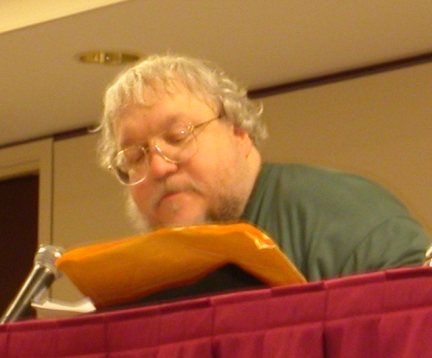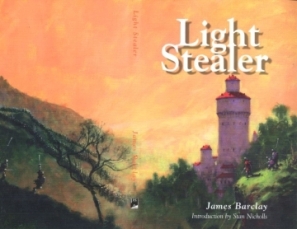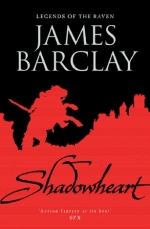How Not to Stalk the Guests at
Worldcon
The Agony Column for August 30, 2003
Commentary by Rick Kleffel

|
|
Yesterday's schedule, crumpled and frail.
|
We haven't read any Discworld books.
We don't like Firefly.
We're not stalking Charlie Stross.
As I look at my much folded, crinkled, parchment-like schedule
from yesterday, I'm rather glad that without my glasses, I can't
see anyone around me. I must be something of a sight here in the
lobby of the Royal Fairmont York. I've captured a little round
table in the lobby, twisted a chair about and pushed the lamp
aside so that I can work on my laptop while my wife sleeps. I did
a fair amount of coughing last night -- what with the 10 PM dinner
and all -- and she deserves, no she'll need some rest for today's
festivities.
My day began early yesterday. I got up at 5.20 AM and wrote out
the column that posted yesterday, then headed over to the
Convention Center to see what was up with the Kaffeeklatsch
signups at 7 AM. I managed to find a couple of folks over there
who would have happily had a long conversation while I waited
patiently, had I actually waited patiently. Instead, they very
kindly told me that they were registration that their day started
at nine AM, thankyouverymuch, and that the folks over at the info
desk who ran the signups would probably start at that time as
well.
I returned about an hour and a half later, having made some
major headway into David J Schow's new novel, 'Bullets of Rain'.
It's great to have Dave back in the novel business, let me tell
you, and not a little relief to be reading something very much
other than SF at an SF convention. Upon my return there were four
people milling about, and I was very kindly informed that the line
for the Kaffeeklatsch signups started back there. After about five
minutes of standing up, I sat myself down and read Schow's novel
while a line formed behind me.
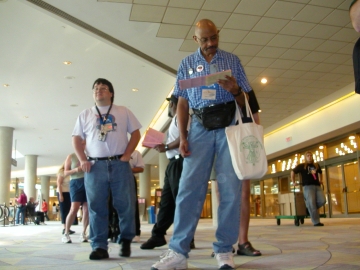
|
|
Some of these people may have been disappointed.
|
That line got pretty long, long enough so that some folks at
the end were going to be disappointed depending on who they were
signing up to see. And we were all disappointed as 9 came and
went, 9.15 came and went, and while the info desk filled up the
signup sheet lady never showed. When she arrived late and harried,
she explained she had overslept. Fine, great, but it happened that
the first girl in line had waited in vain because there were no
indications before as to who would be available for signups. But I
wasn't disappointed; today I'll be talking to China Mieville, John
Clute and Ellen Datlow.
Post coffee, post everything, the wife and I showed up
for the George R. R. Martin reading. My wife and I enjoy the
readings because well, we're both readers. Hearing an author read
his work is an immensely rewarding experience that is unpolluted
by the contributions of well-meaning audience members of the
panels.
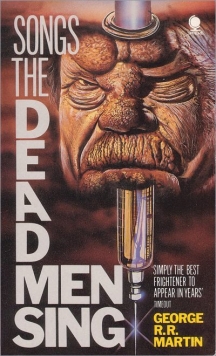
|
|
My first George R. R. Martin purchase.
|
While I've read quite a bit of George's earlier work -- I
bought a very seedy paperback collection ages ago in the Monterey
Park bookstore -- I haven't read any of the more recent fantasy
work that he's been doing. It all comes very highly recommended by
people I trust, but the fact of the matter is that the radio
station introduces a rather welcome uncontrolled element to my
reading list, so I don't always get to read what I think I'd want
to read, and neither has my wife. But the reading convinced me
that there's a reason why everybody loves this new work so much.
Martin has some great prose, and in the reading the pictures he
painted were crystal clear, in spite of my utter unfamiliarity
with his entire setup. Alas, at times the partitions that were
pulled between the rooms allowed the sounds of those next door to
impinge upon my consciousness. Still, the performance was
powerful. I'm ready to sign up for his saga, and mayhaps will
start reading them with the aim of catching up to his part of the
saga slightly before the fourth book comes out. But it's clearly
not yet done, and the six-book limit that Martin set for himself
seems pretty porous at this point. I guess that originally there
was to be a five-year gap between the end of book 3 and the
beginning of book 4. That's now shrunk to a five-minute gap. One
of the most interesting things about attending a convention is to
see writers struggling with their own creations, to see them
fighting battles with their own fiction. Martin wrapped up about
five minutes before the end of the session and had just enough
time to explain where things were. Then Claire and I were off to
the races.
From noon until five PM, we shuttled from panel to panel to
reading to reading to panel. It was pretty hectic. On our way from
the reading to the panel, I saw Charlie Stross, and stopped and
asked him about an interview for this column. I rather regretted
it. Charlie is sort of the belle of the ball here -- from what I
can tell -- and he quickly acquired the look of a butterfly
contemplating the pin that was about to affix it to a Styrofoam
display board. I had seen his posts on Usenet for a bezillion
years, from back in the Quotron Days, and I'd obtained his
signature on my convention book last year, in a line of one
person. That's no excuse. I had seen him a couple of times the day
before and I could see the desperation quotient rising as he
scuttled about between the seemingly constant panels he'd been
assigned to. What made it worse was that I had attended those
panels, as they were actually in topics that interested me. On
this final stop, I felt really bad, like some sort of stalker,
which I wasn't. Really. I'd seen a couple of other writers I knew
-- Cory Doctorow, and even Liz Williams the day after we'd had out
Kaffeeklatsch. Claire identified the sort of walk that these
writers have to assume. It's a quick stride, eyes fixed firmly on
the sidewalk about six inches in front of their feet. The pressure
to pack in a year's worth of publicity must be quite intense. On
the other hand this may all be some sort of terror-noia (thanks
Mr. Doctorow!) on my part. It's most likely that I'm fairly
invisible.
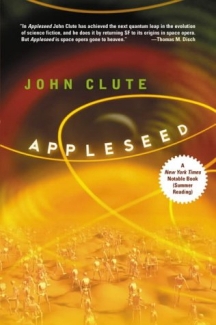
|
|
John Clute's novel for three. If so, I'm in good
company with Thomas Disch.
|
Having rather embarrassed myself, I was happy to head to the
next panel with...Charlie Stross. This was on quote The Maturing
of SF and Fantasy unquote. Everybody concerned thought that the
panel was a bit on the vague side. As usual, so far, half the
panel didn't show. Gordon Van Gelder opined that the maturation of
SF&F was a bad thing. I'm not so sure I agree, but then van
Gelder admitted that he felt his audience was the well-read 13
year-old boy. I can tell him it's a shrinking market. He'd better
start editing video game magazines if he wants a retirement plan.
Charlie talked a bit about deep science fiction, that is SF that
requires a fairly thorough knowledge of the genre before you can
enjoy it, and about the kind of SF novel that only three people
can enjoy. I was apparently one of the three who enjoyed John
Clute's 'Appleseed',
the book in question if I'm not mistaken. But there you go. I'm
the kind of guy who wrote a column on
difficult reading.
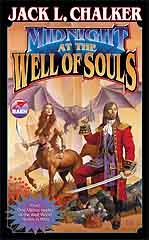
|
|
Jack Chalker's novel of fantasy and mathematics.
|
I was really impressed by Jack Chalker, and once again, here's
the reason to attend a con and the panels at a con. Chalker opined
that some readers probably looked at his books and considered him
something of a commercial writer -- guilty as charged. But when he
spoke of his writing, he made clear his commitment to thoughtful,
entertaining fiction. He talked about how 'Midnight at the Well of
Souls' drew an equal response from the Tolkien-loving fantasy
readers and math professors. That made it sound pretty damn
intriguing to me, and just what I need -- another book that sounds
entertaining. And out of the seminar and on to the next.
This time round it was a panel on 'Buffy: the Triumph of
Characterization'. With Ginjer Buchanan, I knew it would be
well-run and fascinating, and I was not disappointed, and more to
the point, neither was my wife. We're both big Buffy fans, and it
was interesting to hear what editors, writers and fans had to say
about the series. Of course, as in Dilbert, there is often a Loud
Guy, and there was one here. I might actually be the Loud Guy,
were it not for the mollifying presence of my wife, so I have some
sympathy. But still, it does make one wish for the Human Mute
button, and point out the problem of the panels, that is, that
they're no better than the attendees. Sheer statistics would lead
one to conclude that this could be a problem.
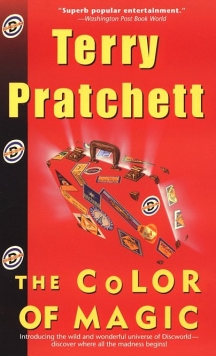
|
|
#1 in the series of books that we haven't
read.
|
Thus, we were more inclined to attend the readings. Here, there
was none of this pesky audience participation, including from YT,
who would not have an opportunity to embarrass himself. Our next
stop was a Terry Pratchett reading. The previous day, when
Pratchett asked in the Discworld 101 panel "Who here has not read
any Discworld books?", my wife and I were the only two to raise
our hands. But we really enjoyed the panel --which was mostly
Pratchett ("How do you talk about God when he's sitting next to
you?"), and we thought the reading would be entertaining. It
certainly was, but it wasn't only Pratchett who was entertaining.
The panel next door was a hullabaloo of yelling, shouting,
clapping and laughter. I had a hard time hearing Pratchett.
Moreover, the people next to us had brought their very small
daughter, and I'm glad for them that they did, and I'm sure it was
nice for her, but she also yakked a bit until they took her.
Having had two children myself -- who are now teenage boys -- I
felt for them. But the real entertainment was the gentleman who
came in late and sat a couple of chairs down from me. Like him, I
enjoy listening to reading with my eyes closed. Unlike him, I
don't fall asleep and snore loudly, tossing and turning. I loved
what did manage to hear from terry's new book, which is terribly
relevant in these tough times. I can't wait to sink into it when I
return, in addition to the other books I intend to buy today.
Next up was China Mieville's reading, in a much smaller room.
It eventually was packed, and China read a riveting and very funny
passage from his newest Bas-lag novel. Damn that guy can write. He
told us he'd be done by the end of the year and that the book
would be out mid/late next year. Apparently, the title is being
passed about on the Internet, but I haven't come upon it, and
China is superstitious about his writing, and wishes it wasn't out
and wouldn't tell us the title. There was 20 minutes or so for
questions and I asked about his comedic tones. He replied that he
didn't put them there deliberately for the most part, and that he
was mostly dark, dark, dark. Then he made everybody laugh with a
dozen witty replies. Go figure. To my mind there's a nice tone of
dark humor that runs throughout his work, and the scene he read
was openly funny. I'd like to see more of that. Dark is fine --and
it's also funny. Great questions here for the most part (except
for mine).
James Barclay's two most recent releases; the wonderful
'Light Stealer' and the as-yet unread 'Shadowheart'
Claire and I were getting a bit ragged by this time, but there
was one I had to attend with James Barclay, author of 'Dawnthief',
'Noonshade',
'Nightchild',
'Elfsorrow'
and 'Light
Stealer'. The theme was 'Fantasy economics', and the entire
panel showed and they were all great. Ed Greenwood had been on the
Terry Pratchett Discworld 101 panel, and had hardly said a word.
More's the pity, because he was quite witty here. Carol Berg and
Cheryl Morgan were also witty and erudite; Cheryl's up for a Hugo
this year for her Emerald City
website. Bill Fawcett showed up late with a passel of problems
and insights for the economics of games. The repartee was
compelling, with Bill Fawcett's tales of computer game woe being
something of a standout. Barclay was funny and very
straightforward; considering economics helps give your characters
depth. His novella, 'Light Stealer' displays this to a great
advantage.
After the panel, I met Simon Spanton, the young editor from
Victor Gollancz who has brought the world some of the best
SF&F writers we've seen in the past five years. It was an
honor to talk to this behind-the-scenes guy responsible for much
of the best fiction out there. Here's a way to choose your fiction
via imprint. If you can find an editor like Spanton, who clearly
has a vision of great fiction, follow him. Darren Nash, once of
Earthlight books has a similar sensibility. There are others --
but that's a different column.
Whipped, beat and pulped, Claire and I tried to eat in one of
the very weird Texan restaurants here in Toronto. We literally had
to run away. We finished up the evening in a panel on 'Why Did
Firefly Fail and Angel Succeed?' Well, it seemed pretty obvious to
us; 'Angel' looks great with nice art direction and set design,
while 'Firefly' always had a sort of bargain basement look. It all
looked very stagey. So, we get into the panel, and they ask: "Who
here likes 'Firefly'?" Everybody but us raises their hands,
cheering. "Who here doesn't like 'Firefly'?" We raise our hands,
to some scattered booing. I felt like Donald Sutherland looking at
a busload of bodysnatchers. And thus was the tone of the final
panel set. It was really informative, and yes, I might give the
show another chance on DVD. But just try being a heretic at an SF
convention. Outcast, stalker, outcast. I tried not relish the
roles, and rather failed.


